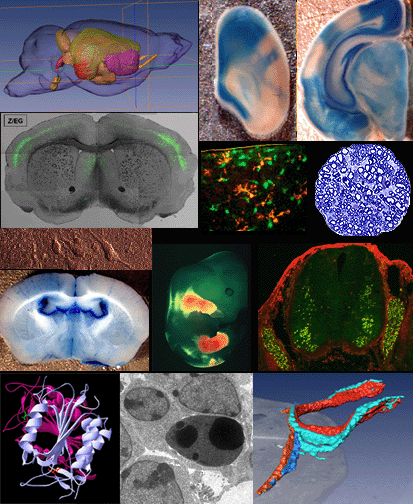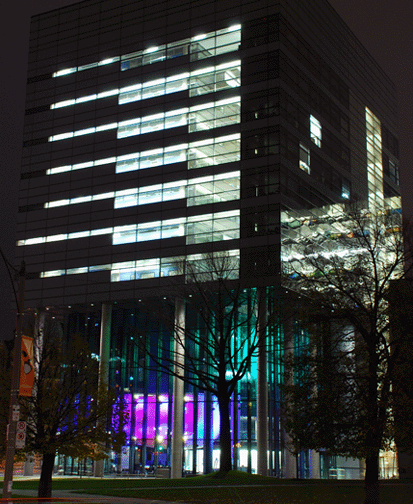
- NeuroMouse
- Antibody/Epitope Registry Database


We are currently accepting Graduate Students!

|
The laboratory's research is organized along three main themes: Post-mitochondrial regulation of programmed cell death in the mammalian CNS. EphB-mediated control of neural connectivity in the CNS. Development and analysis of small molecule therapeutics to PCD. (Laboratory site map). Additional description of research topics:
|
|
2/26/2024 - Congratulations to S. Huang and colleagues on their recent article.
2/23/2024 - Henderson Speaks at SCBA: Cooperative necroptotic - apoptotic cell death signaling interaction in stem cells.
1/16/2023 - Congratulations to T. Cho and colleague on their recent article.
7/28/2023 - US provisional patent # 63/529,494, FMD-Canada.FID9483419, filed 7/28/2023: Method, System and Apparatus for the Introduction of Materials Across Lipid Membranes using Modifications in Hydrostatic Pressure.
6/7/2023 - Henderson speaks at Amgen scholars meeting: Application of CRISPR-based genetic modeling in ES cells and neurons.
5/15/2022 - Henderson speaks at Peking Medical College, Department of Pharmacology, Beijing: Cooperative of Apoptotic/Necroptotic PCD in stroke.
3/24/2022 - Construction of replacement Vserver completed. Dell excluded from all further contracts.
3/01/2021 - Construction of upgraded servers completed.
9/20/2020 - Henderson lab joins CAIREM (Centre for AI Research and Education in Medicine).
4/29/2020 - Congratulations to Dr. Chesa Dojo Soeandy on her successful Ph.D. defense.
3/5/2020 - Special thanks to all staff for their Covid-19 response work.
7/12/2019 - Henderson speaks at SCBA International Symposia in Kunming, China; and 2nd International Congress of the Chinese-American Pharmacological Society.
5/28/2018 - Henderson Chairs (2B), Joint annual meeting of The Canadian Society of Pharmaceutical Sciences (CSPS), Canadian Society of Pharmacology and Therapeutics (CSPT)
12/10/2018 - Distinguished Professor exchange program with Binzhou Medical University begins.
11/18/2018 - Henderson speaks at First International Conference on Talents in the New Era, Binzhou Medical University Shandong China.
1/5/2018 - Henderson, University-wide Health and Safety committee.
9/6/2017 - Henderson, Executive and Administrative Committees, Collaborative Program in Neuroscience.
5/6/17 - MIH Scope Program begins.
08/15/16 - Repairs from flood completed. New servers enabled.
08/15/16 - Congratulations to Maya Latif on her M.Sc. degree.
08/01/16 -
Times University Rankings enabled.
08/20/14 - Faculty of Pharmacy takes on ALS
Ice Bucket Challenge
04/08/14 - Henderson speaks at International Symposium on
Synaptic Plasticity
and Brain Disorders .
10/01/12 - Laboratory bookmarks list updated.
06/01/12 - Special thanks to all staff on recent Heart and Stroke and NSERC awards.
09/14/12 - Congratulations to Sofia Huroy on her M.Sc. degree.
09/15/11 - Congratulations to Ashlin Kanawaty on her M.Sc. degree.
06/28/11 - Henderson speaks at Models of Human Disease Conference.
11/15/10 - Congratulations to Dr. Kelvin Hui on his Ph.D. degree.
06/25/10 - Congratulations to AFPC Pharmacy award winner Kelvin Hui.
01/15/10 - Installation of secondary server system and network upgrade complete.
12/15/09 - Congratulations to Dr. Stephanie Ho on her Ph.D. degree.
10/10/09 - Congratulations to Dr. Anish Kanungo on his Ph.D. degree.
01/20/08 - Web-based scheduling for lab group initiated (motorneuron).
04/20/07 - Remote temperature monitoring installed for all freezers.
11/10/06 - 3D surgical atlases of the murine brain placed online.
10/20/06 - Antisera Epitope registry Database gate io begins.
06/20/06 - Move to new Pharmacy building complete (144 College Ave).
04/02/04 - MIH (Murine Imaging and Histology) Core opens.
07/20/03 - SQL database for gene constructs, cell lines, lab inventory and experimental data enabled.
05/10/03 - CFI/OIT funding granted for development of murine imaging and histology facility.
Lab Mascots:
Meet our low maintenance lab mascot: |
![]()
 Site Navigation:
Address: Rm 903, 144 College Ave., Toronto, Ontario M5S 3M2 Phone: 416-978-5571
|
![]()
![]()
![]()